1. The Grateful Dead
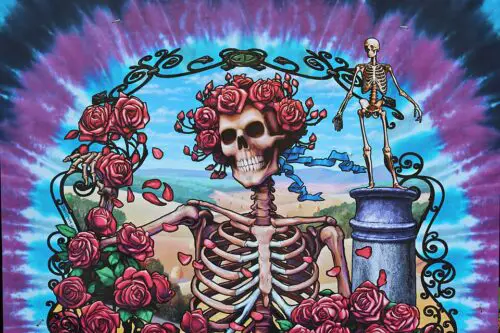
People love to say they’re into the Grateful Dead, but let’s be honest—most of them can’t name a song past “Truckin’.” The band’s sprawling, improvisational jams and the mythology around their live shows make them more of a cultural movement than a casual listen. Saying you’re a Deadhead signals you appreciate counterculture, free expression, and a little chaos. The irony is that most who make that claim can’t sit through a 25-minute live version of “Dark Star.”
At their core, the Dead were about community, not virtuosity, and that’s part of the divide. Their music can be messy and meandering, which turns off people looking for structure. Yet, for some, liking them is shorthand for being spiritually open or musically “enlightened.” It’s less about actually enjoying the tunes than embracing what the band represents.
2. Sonic Youth

Sonic Youth is one of those bands people cite to prove they understand “real” alternative music. Their noise-rock experimentation and use of unconventional tunings earned them underground legend status in the ‘80s and ‘90s. But for all their influence, their music is rarely described as “fun.” You don’t throw on “Daydream Nation” at a party—unless you’re trying to clear the room.
Still, Sonic Youth is a badge of taste, a band that signals you read Pitchfork before it was mainstream. Their dissonance, feedback, and spoken-word cool make them easy to respect but hard to love. Many claim to adore them for their artistic rebellion rather than the actual listening experience. In short, Sonic Youth is less a playlist pick and more an identity statement.
3. Tool

Tool fans are famously intense, and that’s part of the reason people pretend to like them. Their intricate time signatures and philosophical lyrics make them sound like a thinking person’s metal band. But sitting through a 10-minute Tool song can feel more like doing homework than rocking out. It’s impressive music, not necessarily enjoyable music.
There’s no denying their musicianship—Danny Carey’s drumming alone is a master class. But Tool’s whole aesthetic, from cryptic visuals to Maynard James Keenan’s aloof persona, invites over-analysis. People who say they love Tool often like decoding the mystery more than listening to it. They’re the Da Vinci Code of rock.
4. The Velvet Underground

Every indie band owes them something, which is why everyone feels obligated to say they love the Velvet Underground. Their influence on punk, art rock, and experimental music is undeniable. Still, “Sister Ray” is a 17-minute endurance test, not a jam you casually hum. Lou Reed’s monotone delivery and the band’s abrasive sound can be tough to genuinely enjoy.
Fans love to point out that the Velvet Underground sold few records but inspired countless musicians. That story itself became part of their allure—it’s cool to love a band that no one understood at the time. But if you admit you only like “Sunday Morning,” you risk losing indie cred. They’re more revered as an idea than loved as a listening experience.
5. Red Hot Chili Peppers

Red Hot Chili Peppers are easy to claim as a favorite because they’re ubiquitous, funky, and kind of legendary. “Californication” and “Blood Sugar Sex Magik” make you sound cool and laid-back without much effort. But beyond the singles, their discography is uneven, and some albums are famously over-the-top or awkward. Saying you love them often signals an appreciation for the era, the style, or the cultural moment rather than the music itself.
Flea’s basslines, Anthony Kiedis’s charisma, and the band’s overall energy give off a vibe of effortless cool. People pretend to adore them to appear trendy and in-the-know about rock history. In reality, some might skip the deeper cuts entirely. Liking the Chili Peppers is often more about image than actual listening habits.
6. R.E.M.
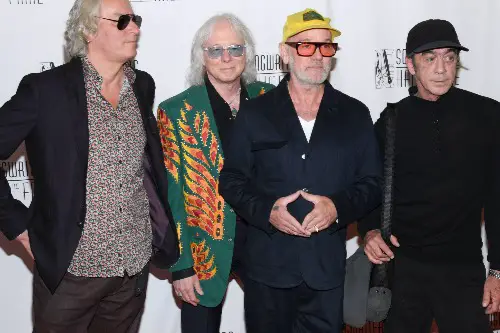
R.E.M. is one of those bands people name-drop to prove they have good taste without actually listening deeply. “Automatic for the People” and “Murmur” are classics, but their jangly, sometimes murky sound doesn’t exactly scream instant gratification. Claiming to love R.E.M. signals that you appreciate alternative rock history and intelligent songwriting. Many fans nod along to “Losing My Religion” while skipping everything else.
Their influence on indie and alternative music is undeniable, but a lot of people never go beyond the hits. Liking R.E.M. becomes more about cultural literacy than musical enjoyment. Saying you love them gives the impression you’re thoughtful and sophisticated. For many, it’s a credibility boost disguised as genuine fandom.
7. Neutral Milk Hotel

Neutral Milk Hotel is beloved by music critics and Tumblr-era romantics alike. “In the Aeroplane Over the Sea” is whispered about like scripture, full of surreal lyrics and lo-fi production. But a lot of people who claim to love it have only heard it once. It’s more of a rite of passage than a regular listen.
The album’s mythology—Jeff Mangum’s reclusiveness, the Anne Frank inspiration, the raw emotional honesty—makes it feel sacred. That’s part of why it’s so performative to “love” it. The truth is, the record can sound like a fever dream of a man playing a saw in his bedroom. People don’t love the sound—they love the symbolism.
8. The Doors

The Doors are rock canon, but a lot of their appeal relies on Jim Morrison’s image more than the music itself. Morrison’s poetic mystique and tragic early death helped cement his legend. But for many listeners, the organ-heavy jams and spoken-word detours don’t hold up. “The End” sounds more like a performance art piece than a song you want on your playlist.
People pretend to love The Doors because they want to be associated with rebellion and danger. Liking them signals you appreciate the “deep” side of the 1960s. In reality, Morrison’s lyrics often teetered between profound and pretentious. Most fans are chasing the myth, not the melody.
9. Pavement
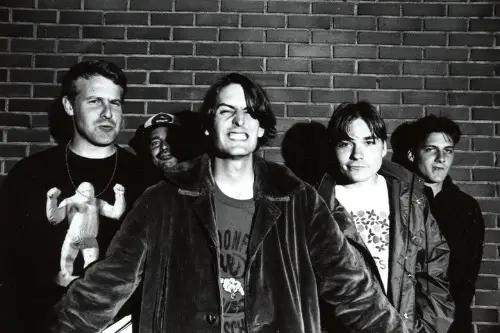
If you’ve ever met a record store clerk who smirked at your playlist, they probably worship Pavement. The band’s messy, ironic approach defined ‘90s indie rock, and critics adore them for it. But their slacker attitude and half-sung vocals can make their songs feel inaccessible. You have to “get” Pavement—and that’s the problem.
Saying you like them signals you understand that music doesn’t have to be polished to be good. Yet, for casual listeners, their music can sound like demos that never got finished. “Cut Your Hair” is catchy, but the rest often feels intentionally underwhelming. People pretend to love Pavement to prove they’re above mainstream taste.
10. Wilco
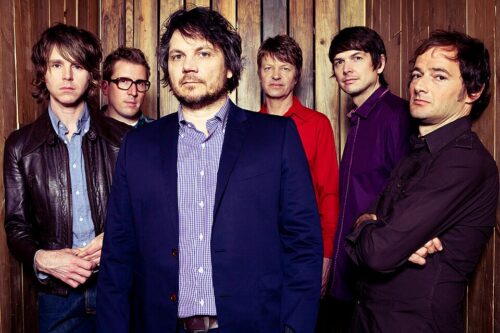
Wilco’s fans often act like the band reinvented Americana, and in a way, they did. “Yankee Hotel Foxtrot” blended alt-country with experimental rock and was hailed as genius. But for every person who loves it, there’s another quietly admitting it’s kind of… boring. The songs drift rather than drive, and the emotion can feel distant.
Still, liking Wilco makes you look like someone with refined taste—patient, thoughtful, maybe even literary. They’re the musical equivalent of reading David Foster Wallace. You might not always enjoy it, but you feel smarter for trying. People pretend to love Wilco to prove they have “grown-up” ears.
11. Phish

Phish fans treat the band like a lifestyle, and that’s exactly why others fake it. Their marathon live shows, improvisations, and fan-trading culture are legendary. But the uninitiated often find the whole experience tedious or self-indulgent. Liking Phish becomes less about music and more about joining a cult of good vibes.
Many people say they’re fans just to fit in with that community. The band’s mix of jazz, funk, and prog-rock is technically impressive but rarely catchy. You don’t hum a Phish song—you endure it. People pretend to like them to seem laid-back and musically adventurous.
12. Rage Against the Machine

Rage Against the Machine’s political intensity makes them an easy band to name-drop. Their fusion of metal and rap feels righteous and urgent. But let’s be honest—most fans chant along to “Killing in the Name” without knowing what it’s about. It’s rebellion you can headbang to, not necessarily engage with.
People pretend to love Rage because it makes them seem politically aware. Saying you’re into them signals you “get” injustice, even if your activism stops at streaming Spotify. Their message is real, but the fan enthusiasm often isn’t. It’s more about posturing than passion.
13. Bon Iver

Bon Iver’s early story—heartbroken man retreats to a cabin and records haunting music—made him indie royalty. “For Emma, Forever Ago” became the gold standard of sad-boy authenticity. But his later albums got increasingly abstract, full of cryptic lyrics and vocal processing. Liking Bon Iver became more about appreciating the art than actually enjoying it.
Fans praise his evolution as “innovative,” but many secretly miss the simplicity of his debut. Saying you love Bon Iver is shorthand for “I understand emotional subtlety.” The truth is, his music can feel like homework for your feelings. People pretend to love him because vulnerability sounds impressive.
14. Foo Fighters

There’s something convenient about dropping “Foo Fighters” into a conversation when you want to sound like you respect classic rock values without getting too weird. Their arena-ready riffs and Dave Grohl’s affable frontman shtick make them an easy, safe pick for people who want to seem both earnest and unpretentious. But for many, loving Foo Fighters means liking the idea of rock rather than the messy reality of their catalog. It’s a comfort-band choice you adopt to signal solidity, not to challenge your listening habits.
Mostly, people cite Foo Fighters because they bridge grunge pedigree and mainstream polish, which sounds impressive at parties. Fewer actually sit down and listen to a full album start-to-finish these days. The band’s popularity can be shorthand for “I grew up on ‘90s rock” even if you only know the radio hits. In short: Foo is often fandom-lite—more identity than obsession.
15. The Strokes

The Strokes are the go-to band for anyone trying to claim indie-rock credibility with minimal effort. Their early records sound effortlessly cool, and dropping “Is This It” into conversation buys you the right kind of cultural street cred. Yet, their lo-fi slacker charm is performative for a lot of people who really just want to seem unclubbable and tasteful. Saying you love The Strokes signals a curated hipness more than deep engagement.
A handful of songs get replayed at brunch and then forgotten, while the rest of their catalog quietly gathers dust. The band’s aesthetic—detached vocals, angular riffs—makes it easy to posture about “getting it.” That ambiguity lets half-hearted fans ride the wave of indie nostalgia without committing. Many name-check The Strokes for effect, not because they’ve fallen in love with the band.
16. The Killers

The Killers are the kind of band that allows people to sound both stadium-big and literate at once. Anthemic singles like “Mr. Brightside” function as cultural shorthand for emotional intensity and cinematic melodrama. But beyond the singles, the band’s earnestness can feel manufactured, and some listeners admit their fandom mostly exists in playlists and karaoke bars. Claiming to adore The Killers often reads as picking the safest dramatic option in a conversation about taste.
People like to say they love The Killers because it makes them seem nostalgic and melodically ambitious. The band’s emotional sweep is easy to mimic without actually investing in albums. It’s a performative brand of romanticism: feel big feelings, but don’t be asked to explain why. For many, liking them is less about ownership and more about borrowing atmosphere.
17. Imagine Dragons

Imagine Dragons are perfect for people who want to appear contemporary and mainstream-savvy without sounding too niche. Their radio-heavy hooks and stadium-sized choruses are instantly recognizable and socially safe. But the band’s maximalist production and repetitive lyrics give skeptics an easy target, and plenty of claimed fans only stream the singles when they come on at the gym. Saying you like Imagine Dragons often signals you follow current charts rather than personal taste.
There’s nothing wrong with enjoying catchy pop-rock, but admitting that can feel trivial in some music circles. So, people hedge by saying they “respect” the band or that they appreciate their arena energy. That phrasing transforms simple enjoyment into tentative cultural capital. The band becomes a credential you cite to seem plugged-in, not a constant in your rotation.
18. Green Day
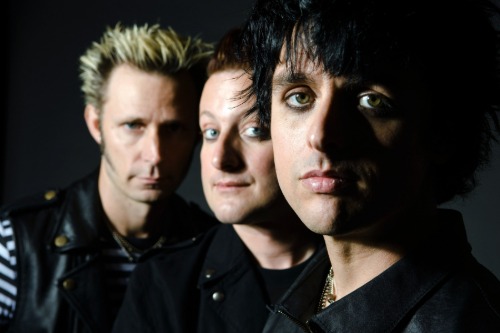
Green Day has this useful dual identity: punk credibility for older listeners and anthem-fueled nostalgia for millennials. Dropping Green Day into conversation can show you understand punk’s mainstream crossover without sounding like a bore. But for the people who name-check them to seem edgy, the reality is often a handful of radio staples and a vague memory of a high school mosh pit. Claiming Green Day as a favorite can be less ideological commitment and more nostalgic costume.
The band’s boom-and-pop songwriting makes their hits ridiculously clickable, which explains their enduring presence. Still, the more serious punk crowd sometimes views that mainstream success as reason enough to perform affection rather than feel it. Wearing Green Day fandom can therefore be performative, signaling a rebellious identity while staying safely popular. It’s a compromise between authenticity and accessibility.
19. Linkin Park

Linkin Park occupies a weird middle ground where emotional earnestness meets commercial polish, and that makes them easy to name in certain company. Their fusion of rap, metal, and melodic hooks made them a soundtrack for angsty adolescence, which many people still invoke to signal emotional depth. But decades later, a lot of professed listeners cling to a handful of formative songs rather than the full, varied discography. Saying you love Linkin Park can be shorthand for “I had feelings in high school” more than an ongoing musical devotion.
The band’s dramatic production and cathartic choruses invite big reactions but also invite irony from hipsters. That dynamic lets people adopt Linkin Park fandom as a cultural marker: relatable and intense, but safe to outgrow. Many use the band as a nostalgic touchstone rather than a current obsession. It’s less about active listening and more about referencing a shared emotional vocabulary.
20. Kings of Leon

Kings of Leon are frequently name-dropped when someone wants to sound rootsy and cool without diving into Americana complexity. Their early Southern-tinged rock gave way to arena-ready pop, which is a comfortable compromise for people who want authenticity that’s also digestible. Yet, a surprising number of self-proclaimed fans mostly know the major singles and the general vibe, not the deeper cuts. Claiming Kings of Leon as a favorite often reads like an attempt to balance earnestness with mainstream accessibility.
The band’s shift toward glossy choruses made them radio staples, ideal for background playlists and driving playlists alike. That ubiquity makes it easy to say you love them without much risk of being pressed for details. As a result, liking Kings of Leon often functions as identity shorthand: rustic cred with zero awkwardness. People pretend to love them because the band sounds like the safe version of cool.
This post 20 American Bands People Pretend to Like to Make a Point was first published on American Charm.


